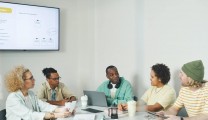“Collaboration is a conversation that arises out of individual release, from which all parties come away with new ideas. The basic technique of Collaboration is reconceiving. Reconceiving in Artful Making replaces the industrial technique of replication, and the political technique of compromise. Collaborators reconceive a problem or process in light of each other’s contributions, using them as material out of which, in combination with their own ideas, they make new, unpredictable ideas. When artful makers collaborate, either on a play production or a business plan, they contribute to making something else as well, something larger than the individual makers: an ensemble.”
The purpose of the ImprovAgility workshop is to turn Teams into Ensembles, which are teams that build on each other’s ideas to create and innovate. The foundational program is a one-hour workshop that introduces the concept of collaborative emergence by presenting examples of emergence from natural and business ecosystems and relates those examples throughout the exercises performed in the workshop.
ImprovAgility uses exercises from Improvisational Theater that are targeted to developing skills required to be a great collaborator:
- focus
- listening
- expressing
- thinking on your feet
- moving
- building on others’ ideas
- creating

The workshop opens with a warm-up exercise Zip, Zap, Zop which engages all of the participants in movement, focus and acting silly, as a reminder that we are all human and we can let loose and have some fun. At the outset, the expectation is set that we don’t want people to try and “perform.” The exercises are not about comedy, learning to be funny or becoming an actor. They are about people working from their current skill level to develop and improve. And it’s not a requirement to be particularly good at it in order to engage, contribute, learn and have some fun. We are seeking to release the Introvert in all of us so that little and big ideas alike may emerge.
In Improvisational Theater the basic exercise that actors use to build on each others ideas is an exercise called Yes, And. In Yes, And, one participant starts out by making a statement of an idea and the next participant steps up by accepting that idea and then building on it with an enhancement. This continues for a few rounds as the Team–on its way to becoming an Ensemble–drives to an emergent outcome. Playing this game can have a profound and almost immediate effect in building a mindset of accepting and building. The ImprovAgility Collaborative Emergence workshop uses this exercise as the platform for training to resolve issues through a truly collaborative effort. After a round of Yes, And, the workshop moves on to engaging participants in additional exercises that are targeted to individual skill building that, taken together, improve everyone’s ability to use Yes, And for real problem solving:
- One Word Story – focus, listening, building on others ideas
- Three-Headed Expert – thinking on your feet, creativity
- Writing a Novel – focus, listening, expressing, thinking on your feet, building on others ideas
- Why are you late? – movement, listening, accepting, creating
- Constraints – movement, expressing, thinking on your feet, adapting
- Yes, And – this time focused on a real hypothesis, leveraging the other exercises

We conclude the workshop with a conversation about the emergent behavior we experienced and what we learned from performing the exercises. We reflect back on the emergent characteristics of natural ecosystems that we had previously discussed to draw comparisons of the behavior of complex adaptive systems from different contexts.
The response to the ImprovAgility Collaborative Emergence workshop has been very enthusiastic. We recently presented at a conference and the most rewarding feedback included participants expressing that it was a great way to learn and that, in a short hour, they developed a kinship with the other participants that lasted throughout the conference. The workshop was engaging, lively, fun and one that they wouldn’t soon forget.












Replies to This Discussion